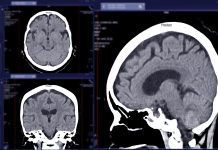In a significant advancement for Alzheimer’s disease diagnosis, new blood tests have emerged as potentially groundbreaking tools
A recent study led by Dr. Suzanne Schindler and her team at Washington University School of Medicine in St. Louis compared the accuracy of six commercial blood tests designed to detect signs of Alzheimer’s disease, particularly amyloid plaques in the brain.
Presented at the Alzheimer’s Association International Conference, the findings reveal promising results that could change the way Alzheimer’s is diagnosed and treated.
Identifying key Alzheimer’s disease features
The study, part of a project by the Foundation for the National Institutes of Health Biomarkers Consortium, evaluated blood tests from companies like ALZpath, C2N Diagnostics, Fujirebio Diagnostics, Janssen, Quanterix, and Roche Diagnostics.
Among these, tests measuring a biomarker known as phosphorylated tau 217 (p-tau217) stood out for their accuracy in identifying key Alzheimer’s disease features: amyloid and tau levels in the brain, brain volumes, and cognitive symptoms.
Dr. Kellen Petersen, co-lead of the study, emphasized the effectiveness of p-tau217, noting that it surpassed other biomarkers and combinations in accuracy. “P-tau217 alone can do it all. It accurately predicted levels of amyloid and tau in the brain, brain volumes and cognitive symptoms.” Petersen stated.
More accessible Alzheimer’s diagnosis
Currently, diagnosing Alzheimer’s disease often involves invasive procedures like spinal taps or brain scans. However, these new blood tests offer a less invasive alternative that could make diagnosis more accessible and convenient for patients.
“This head-to-head comparison provides doctors with reliable information on which tests can best aid accurate diagnosis” said Dr. Schindler, underscoring the importance of these findings for clinical practice.
The FDA-approved drugs for Alzheimer’s treatment also target amyloid, necessitating confirmation of amyloid buildup before prescription. The ability of these blood tests to detect such biomarkers could streamline the process of identifying suitable candidates for these treatments, potentially altering the course of the disease for many patients.
Top performers in the study
Among the top performers in the study were C2N Diagnostics’ PrecivityAD2 and Fujirebio’s Lumipulse, both incorporating measures of p-tau217. These tests demonstrated high accuracy across multiple measures, meeting the minimum criteria recommended for clinical use.
Looking ahead, the study’s data and algorithms are available to researchers through the Alzheimer’s Disease Neuroimaging Initiative, facilitating further exploration and validation of these tests.
The development of accurate blood tests for Alzheimer’s disease represents a significant step forward in clinical care. As research continues to refine and validate these tests, they hold the promise of earlier and more precise diagnosis, crucial for timely intervention and improved outcomes in Alzheimer’s treatment.








